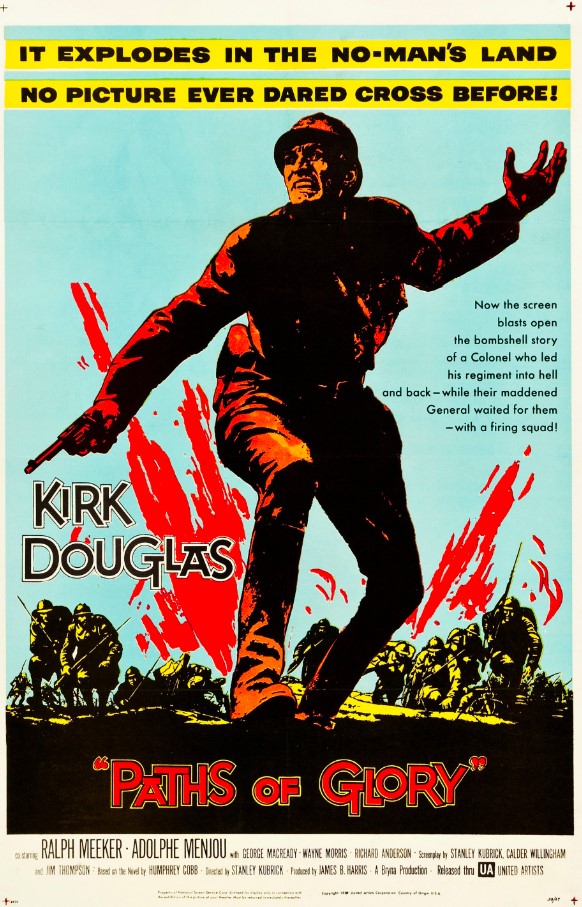Paths of Glory
Sinopsis
Paths of Glory is set during World War I, focusing on the French army’s trench warfare against the Germans. The story centers on Colonel Dax, played by Kirk Douglas, who is tasked with leading an attack on a heavily fortified German position known as the “Anthill.” The attack is doomed from the start, as it is clearly a suicide mission with little chance of success.
Despite Dax’s objections, General Mireau insists on proceeding with the attack, motivated by the prospect of a promotion. As expected, the assault fails disastrously, resulting in heavy casualties and a retreat by the French soldiers. Enraged by the failure, Mireau orders that three men be randomly selected from the regiment and court-martialed for cowardice to set an example.
Colonel Dax, who is also a lawyer in civilian life, takes up the defense of the accused men, determined to save them from a predetermined guilty verdict. The court-martial is a sham, with the men given no real chance to defend themselves. Despite Dax’s impassioned arguments and clear evidence of the attack’s futility, the men are found guilty and sentenced to death by firing squad.
The film poignantly depicts the men’s final moments, highlighting their varied reactions to their impending execution. Dax continues to fight for their lives, appealing to higher authority, but his efforts are in vain. The execution is carried out, illustrating the brutal and unforgiving nature of military justice.
Paths of Glory concludes with a scene that contrasts the dehumanizing aspects of war with a moment of shared humanity, as French soldiers listen to a captive German girl sing in a tavern, moved by her song. This moment serves as a powerful reminder of the common humanity that exists even amidst the horrors of war.
- Taglines: “It explodes in the no-man’s land no picture ever dared cross before!”
- Genres: Drama, War
- Duration: 88 minutes
- Year: 1957
- Rated: Not Rated
- Metascore: 90

Interesting Facts
- The film is based on Humphrey Cobb’s 1935 novel of the same name.
- Stanley Kubrick was only 29 years old when he directed Paths of Glory.
- The film was banned in France for several years due to its critical portrayal of the French military.
- Kirk Douglas played a crucial role in getting the film made, using his star power to secure financing and support.
What Makes the Film Great?
Paths of Glory is a searing critique of the futility and brutality of war, brought to life through Kubrick’s masterful direction and Douglas’s powerful performance. The film’s stark cinematography, intense courtroom drama, and unflinching portrayal of the horrors of war make it a timeless and impactful piece of cinema. Its exploration of moral courage and the human cost of conflict resonates deeply, offering a poignant commentary on the nature of military power and justice.
Director
Stanley Kubrick, one of cinema’s most influential directors, helmed Paths of Glory. Known for his meticulous craftsmanship and innovative storytelling, Kubrick’s other acclaimed works include 2001: A Space Odyssey, A Clockwork Orange, and The Shining. His ability to tackle diverse genres and complex themes is evident in this powerful anti-war film.
Cast
- Kirk Douglas: Colonel Dax
- Ralph Meeker: Corporal Paris
- Adolphe Menjou: General Broulard
- George Macready: General Mireau
- Wayne Morris: Lieutenant Roget
Visual Effects
The visual effects in Paths of Glory are minimal but highly effective. The stark, realistic depiction of trench warfare and the brutal battle scenes are achieved through practical effects and detailed set designs. Kubrick’s use of tracking shots and deep focus adds to the film’s immersive and harrowing portrayal of war.
Soundtrack
Gerald Fried composed the soundtrack for Paths of Glory. The music enhances the film’s emotional depth, with a score that underscores the tension and tragedy of the story. The use of military marches juxtaposed with somber melodies reflects the film’s themes of honor and sacrifice.
Behind the Scenes
The production of Paths of Glory was marked by Kubrick’s meticulous attention to detail and insistence on authenticity. Filming took place in Germany, with real trenches constructed to recreate the battle scenes. Kirk Douglas’s commitment to the project was instrumental in bringing Kubrick’s vision to the screen, despite initial resistance from studios due to the film’s controversial subject matter.
Awards
While Paths of Glory did not receive major awards at the time of its release, it has since been recognized as one of the greatest anti-war films ever made. Its critical acclaim and enduring influence highlight its importance in the history of cinema, with numerous accolades from film critics and historians over the years.
